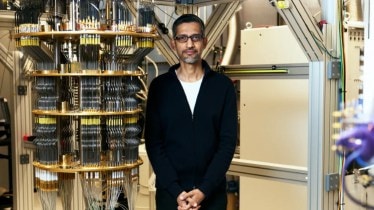As investors continue to move out of AI stocks, Alphabet CEO Sundar Pichai has stepped in with a strong reminder: no company, including Google, is shielded if the AI bubble bursts.
In an exclusive conversation with BBC News, Pichai spoke on the extraordinary surge in AI investment over the past year, stating there is real innovation happening in AI but also “irrationality” creeping into the market.
‘No company is going to be immune’
The fear of an AI bubble has been growing in Silicon Valley and beyond as valuations skyrocket. Asked whether Google could escape the fallout if the bubble popped, Pichai didn’t sugarcoat it.
“I think no company is going to be immune, including us,” he told the BBC. He added that while Google has the strength to weather market volatility, the risks are real for everyone.
Alphabet itself has seen shares double in just seven months, lifting the company to a $3.5 trillion valuation. Much of the optimism comes from Google’s ability to keep up with OpenAI, especially through its specialised superchips poised to compete with Nvidia’s offerings.
But behind the excitement, analysts are sounding alarms. A complex web of $1.4 trillion in deals surrounding OpenAI, regardless of the firm making a fraction of that in revenue, has raised comparisons to the dot-com boom.
The concern is a painful bust could follow, as it did in 2000 when overhyped companies collapsed, wiping out savings and jobs.
Pichai reminded us of a historical warning once made by former US Fed chair Alan Greenspan about “irrational exuberance,” reminding that tech cycles tend to significantly “overshoot.”
“We can look back at the internet right now. There was clearly a lot of excess investment, but none of us would question whether the internet was profound,” he said to BBC.
“I expect AI to be the same… there are elements of irrationality through a moment like this.”
Why Pichai thinks it can ride out the storm
Pichai said Google’s “full-stack” advantage, from chips to data, from YouTube to DeepMind, puts it in a stronger position during turbulent times.
Alphabet is also deepening its footprint in the UK. The company has committed £5 billion to AI infrastructure and research, and Pichai revealed that Google will, for the first time, start training its AI models in the UK, a move the British government believes could help make the UK the world’s No. 3 AI hub.
“We are committed to investing in the UK in a pretty significant way,” he told BBC.
Concern of AI’s energy footprint
One of the biggest concerns Pichai raised was AI’s massive energy footprint. According to the International Energy Agency, AI already consumed 1.5% of the world’s electricity last year.
He warned that governments, including the UK, must scale up energy production and infrastructure if they want to support AI’s explosive growth.
“You don’t want to constrain an economy based on energy, and I think that will have consequences,” he told BBC.
He also added that Google’s rapid AI expansion has delayed its climate goals, though the company still plans to hit net zero by 2030.
“The rate at which we were hoping to make progress will be impacted,” he admitted to BBC.
AI’s Impact on work
Beyond the market and energy challenges, Pichai added that AI will fundamentally reshape work across industries. Calling AI “the most profound technology” humans have worked on, he said society will face significant disruption but also new chances to grow.
“It will evolve and transition certain jobs, and people will need to adapt,” he said, adding that those who embrace AI tools will benefit most. Whether you’re a teacher or a doctor, he said the job roles won’t disappear but expectations will shift.
“All those professions will be around, but the people who will do well… are people who learn how to use these tools.”
